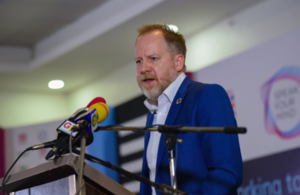DFID Ghana Director's Speech on World Mental Health Day 2019
The UK Government, through DFID, is supporting Ghana to ensure mental health care is delivered as an essential component of Universal Health Coverage.

Philip Smith presenting a speech on Mental Health Day
I’m delighted to be here today to take part in this panel discussion to mark Mental Health Day.
Today is a day for us all to pause and reflect on the importance of mental health for us as individuals, for our families and for our places of work.
One out of every four of us here sitting here today will have a mental health episode during their lifetime.
We also reflect soberly on this year’s theme of Suicide Prevention.
The World Health organisation tells us that despite progress, globally one person dies every 40 seconds from suicide. And suicide is the second leading cause of death among 15-29 year-olds.
Whilst the headline figures are compelling, we need more data on what this means in Ghana to understand why it is happening to young girls and young boys.
But one thing is clear. Mental health cannot be ignored. It is a global issue to be addressed in all of our societies.
In Ghana, as in the UK and in many parts of the world, people with mental health conditions have been left behind and excluded.
More needs to be done. In the UK we have been keen to put Mental Health on the global agenda and last year hosted the first ever Global Ministerial Mental Health Summit in London.
In Ghana, he UK has been a proud supporter of mental health for more than ten years. Over this time, we have seen considerable changes:
• All districts in Ghana now provide mental health services compared to 32 districts just six years ago.
• We have helped train more than 5,000 health workers on how to treat mental health conditions, with over 100,000 people receiving treatment for mental health conditions in 2018.
• Community self-help groups in the northern regions and here in Accra supported by UK Aid have reached over 32,000 people.
We congratulate the Government of Ghana in its foresight in making Mental Health a priority. Backing this commitment with sufficient resourcing and appropriate legislation will be the key to affecting real change. The UK Government, through DFID, is supporting Ghana in achieving the necessary paradigm shift to ensure mental health care is delivered as an essential component of Universal Health Coverage.
This will mean focusing more concretely on improving access to services – making sure that these are integrated into general health services and are closer to communities; and free at the point of use to those that need them.
In this way, we hope that every Ghanaian affected by a mental health condition, especially the poor and most marginalized will have access to the care they need.
In Ghana, as in many countries, more needs to be done to overturn stigma and discrimination and support the full, active inclusion of people with mental health conditions.
Next month, a UK Aid supported programme will be looking to tackle stigma among the urban youth, who are among the most vulnerable but are also the key to securing Ghana’s long-term future. We will continue to work with the Government of Ghana, the World Health Organisation and Ghanaian partners at the grassroots to erode the stigma and discrimination around mental health; and put human rights at the heart of Ghana’s approach to mental health.
Ladies and Gentlemen,
As we mark World Mental Health Day, our thoughts are with those families devastated by suicide.
Mental Health day is an opportunity to renew our commitment to work in Ghana and elsewhere towards transforming mental health, to promote care and support that is high quality, meets people’s needs and respects their dignity and rights.
Mental Health exists on a spectrum, from mild, time limited conditions, to chronic, progressive, severely disabling conditions.
We are all on the continuum – all of us, in all countries and at all ages – and some of us move along that spectrum. We all need to pay as much attention to our on mental health as we do our physical health.
Finally, I want to thank BasicNeeds for bringing us all together today to discuss the issue of suicide prevention.
I look forward to learning more about how we can better support people to improve their mental health and how the UK can best partner with Ghana on this important, but seldom discussed, issue.
Thank you.